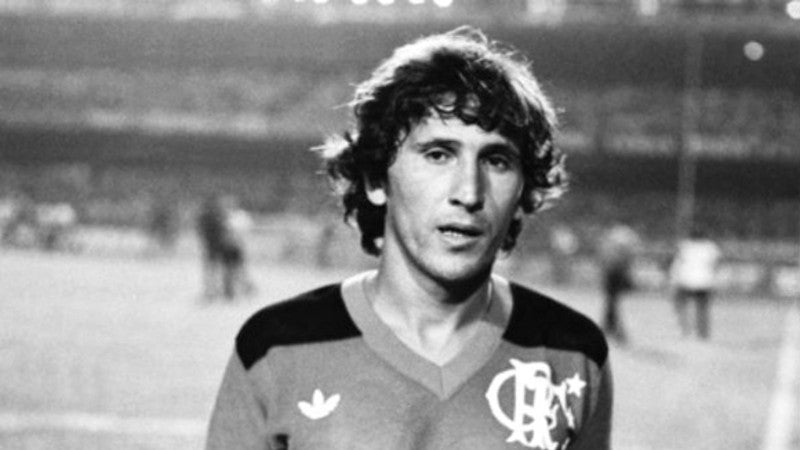
ZICO - THE SOUL OF BRAZILIAN FOOTBALL
Arthur Antunes Coimbra - AKA “Zico,” is near the very top of our all-time TENLEGEND list. Born on 3rd March 1953 in Rio de Janeiro, Zico was originally called "Arthurzico'' by his family, which was later shortened to Zico. The Brazilian radio commentator, Waldir Amaral, gave him his second nickname of O’Galinho (the little rooster), inspired by the defiant quiff hairstyle Zico had in his early years.Zico was not the first, not the second, but the third professional player in his family.

His journey of becoming a legend on the pitch began in the year 1971 when he started his club career for Flamengo. An attacking midfielder by nature, Zico is considered to be one of the most precise finishers and best passers ever, and one of the greatest players of all time. Often referred to as the “White Pelé,” the predominantly right-footed Zico was blessed with an abundance of skill.
The key differentiator was that he was much more direct and would attack at greater sustained pace than his legendary predecessor in the yellow number 10 shirt. He was a great passer, a team leader, and was known for his extrasensory vision on the field. Zico was also ambidextrous with his feet and executed free kicks with precision.
He was key for Flamengo to win four national titles (1980, 1982, 1983, and 1987). On the field, Zico scored goals in all imaginable ways, with a creativity that rivals many.

At the age of 30, Serie A finally captured a man it had coveted for almost a decade. His advancing years meant that the heavyweights of Milan, Turin and Rome hesitated to pay a hefty investment to obtain his services. AC Milan and Roma, in particular, made previous serious attempts to sign him, but it was the lesser team of Udinese who met all the demands required to clinch his signature.

Zico gave Udinese 2 years of outstanding contribution, leaving a permanent mark, between 1983‑1985. The Italian club even has a supporters' group named after him who take a banner with the Brazilian's name to every home and away game. Zico scored 59 goals in 73 games for the Italian club. The switch from Flamengo was seamless, yet the successes Zico enjoyed at Udinese were all personal.
He then returned back to Flamengo and continued to play until 1989. In 212 appearances, he managed to score 123 goals for Flamengo. While the Spain 82 and Mexico 86 vintages of the Brazil national side are widely seen as the last stands of the samba style ethos, as directed by the bold brilliance of Telê Santana, Zico was vaguely at odds with the slow build-up play that was conducted on the pitch by the late, great Sócrates. 
According to Kashima Antler’s club history, “In May 1991, three months after participation in Japan’s first professional league was confirmed, ‘God’ Zico arrived in Kashima. From that point on Kashima Antlers have walked together with ‘God’. He didn’t only lead the team on the pitch as a player, but also passionately explained the things required of a professional football club, leading Executive Vice President and Sporting Director Mitsuru Suzuki to say, ‘I still remember those things now, nothing has changed.’ Zico retired as a player after the 1994 Suntory Series and returned to Brazil.”
Although he never won a World Cup, Zico always appears in lists of all‑time football legends. In 2000, he was behind only Pelé and Garrincha among Brazilians in FIFA's "Player of The Century" vote. Zico continues to influence the game and its audience to this day. His charisma on and off the field has brought him love from Brazilian fans, but also from all over the world.

His is a career of high individual talent, coupled with collective successes during his time with Flamengo, but offset by the frustrations of what might have been – perhaps what should have been – in the yellow shirt of Brazil. Along with Lionel Messi, Johan Cruyff and Ferenc Puskás, Zico lives alongside the greatest players to be denied a World Cup winner’s medal. Even after retirement, in 1994, Zico (always good-natured and up for a challenge) received an invitation to play beach soccer and by scoring 12 goals, he helped his team win the Beach Soccer World Cup 1995.
Post-retirement, he returned to Kashima Antlers as a technical advisor and after that, he managed many other teams including FC Goa and the Japanese national football team, returning to the Antler’s once again in 2018. Zico is undoubtedly a total class act and always demonstrates an almost tangible sense of humility. We are so lucky to witness the player, and the man himself. We have the utmost respect for Zico - a football legend.
Join us in celebrating Zico.
Be a TENLEGEND®.
